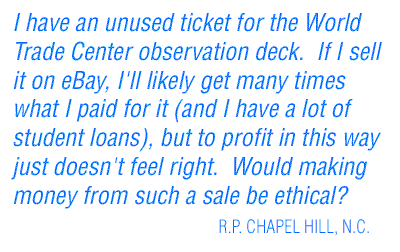Last night’s planned baking extravaganza went awry. The situation was perhaps best described by today’s Chronicle in a remarkably redundant headline: Blackout puts S.F. in the dark. Personally, I’ve always wondered if a blackout could bathe a city in light. And, last night, it did in spurts. Flashlights, headlights, candles, and small halogen lamps replaced cruddy fluorescents. There was a rustic silence in the air. Who knew that so many things turned on, locked behind multi-unit buildings and overlocked doors and Victorian facades, created such a subtle din? It was nice to walk the streets, wandering around my neighborhood, looking at my life and surroundings without clutter.
From my own building, an anemic “Eeeeeeeeeeeeeeeee” seethed from the dark newels and balustrades. But it didn’t stop hands from groping in the dark. I became unexpectedly acquainted with my neighbor’s breast, and apologized for this unique, quite accidental housewarming. The sound lost its fresh Duracell perfect pitch quite quickly. This electronic vowel wavered, crumbling with the concealed security systems. It died in the dead of morning.
Phones were denied their electric juice. I was grateful to have a charged cell phone, if only for the dim LCD display functioning as a temporary candle. Humanity’s move to cordless had sucked the life of urban telephony dry. But I did hear one pleasant sound as I walked the streets. From a window, an old-school phone rang, the stark analog bell reminding me of those pleasant chimes we had forsaken long ago. There was purity in that sound, and I missed it. But progress was irrevocable. The phone went unanswered.
While mom-and-pop corner stores locked and chained their doors, Albertson’s stayed open, evincing the mantra, “We Never Close.” A backup power generator fueled a few registers. The overhead lights flickered. People smiled and couples bought bottles of wine, preparing to drink naked beneath undulating counterpanes. I was able to use my ATM card to buy candles, but I felt like I was cheating at a board game. But I wasn’t as ungainly as one young whipper-snapper, who hoped to get his pictures developed at the one hour photo machine. At first, I thought he was joking. And so did the helpful lady behind the counter. When he responded with “Thanks for the sarcasm,” this clerk and I laughed our asses off. Some people fail to understand that human beings once lived for centuries by candlelight. Why pictures now? What pressing priority did this young man have?
Perhaps it reflected the quiet desperation in the air. With routine disrupted, I saw many people standing around, at a loss with how to expend their time. Some sat in stairwells, smoking cigarettes, drinking from bottles, talking, flashing lights at strangers, counting flowers on the wall. Some walked their dogs. Some soothed little ones. Others shined powerful rays out their windows, perched solitary on sills. What to do without the blue orbs reporting “reality?” What to say when they set their minds on silence?
Predictably, the bars were packed. Dipsomaniacs forewent their whiskey-and-cokes and downed straight Jack. Aside from the attached and the hard-line alkies, there weren’t a lot of women. The shuffling shadows kept them indoors, wondering when the power would be restored.
Eventually, I headed home. When I woke up at the crack of dawn, I heard my computer humming. The monsters weren’t due on Maple Street, but I sure as hell missed the silence.


 Apparently, Ewan McGregor’s uncle (Denis Lawson, who played
Apparently, Ewan McGregor’s uncle (Denis Lawson, who played 



